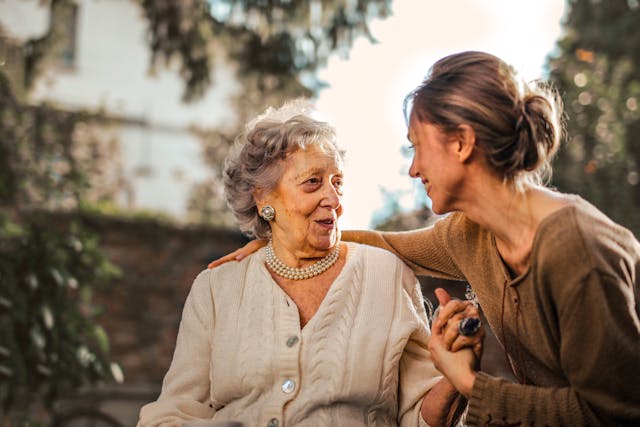Researchers have identified eating a little less, loving a lot more and building strong connections as common threads among the world’s longest living people. We explore how you can their findings to improve your own health.
Babies born in Australia today are tipped to live until age 81.3 if they’re male and 85.4 if they’re female1. That’s at least 10 years more than the United Nations’ world average, but it’s not enough for Australia to be considered a ‘blue zone’.
Blue zones are regions where the locals enjoy life expectancies well above average – reaching age 100 or more. The concept was first developed by demographic researcher Michel Poulain and Sardinian doctor Giovanni Mario Pes in about 2000. In 20042, they joined with National Geographic Fellow Dan Buettner to identify five notable blue zones across the globe:
- Sardinia, Italy
- Okinawa, Japan
- Nicoya Peninsula, Costa Rica
- Icaria, Greece
- Loma Linda (in San Bernardino County), United States.
Each of these locations has such a high concentration of centenarians (people who live to 100) that the population as a whole can be regarded as having exceptional longevity.
Lessons from the blue zones
This longevity appears to be a product of the local lifestyle – what people are eating, how they spend their days, and even who they surround themselves with all play a part. Researchers identify diet, exercise and not smoking as important factors, but so are community connections and having a sense of purpose3.
The good news is these things can be made part of almost anyone’s day, providing an achievable path to a longer, healthier life.
Healthy diets
Diet has a crucial role in our health. While the people of Sardinia probably aren’t preparing the same cuisine as their long-lived Okinawan peers, the types of food – and how they’re eaten – have something in common.
Diets within the blue zones tend to include more plant-based meals. Lentils and beans (especially of the soy, broad bean and black bean varieties) feature heavily, with most centenarians in these regions reducing their meat intake to five times a month.
In addition, these long-lived folk don’t overeat. While it may be hard to turn down a second helping of your favourite meal, one secret to a long life may lie in eating until you’re only 80% full.
Working out naturally
Many people complain that they don’t have time to fit exercise into their busy days. For some, the simplest way to keep in shape is by incorporating regular trips to the gym, or training for special events like a marathon to stay motivated. But that takes effort.
Blue zone residents, however, get most of their exercise from their usual daily routine, instead of in addition to it. This incidental exercise comes in many forms, from tending to a garden as part of their housework, to walking around town instead of running errands in a car.
It really comes down to sitting less and moving more.
Community is key
The people we surround ourselves with have an immense impact on how we feel, and researchers suggest it may also affect longevity. Blue zone inhabitants typically invest a lot of their time and energy into their friends and families.
In many cases, families in blue zones live near (or even with) elderly relatives so they can take care of them. Older relatives play with and look after younger generations, forming lasting bonds.
Blue zone locals also keep a tight-knit group of loyal friends, who will support them through life’s ups and downs.
Mindset and outlook
A positive attitude is another attribute shared across the five regions identified as blue zones. People living in blue zones frequently told researchers they had found a purpose in their lives which helped them stay positive and motivated.
Although it may seem abstract, research suggests having a purpose in life can add as much as seven years to someone’s life expectancy4.
Blue zone natives also have different ways of handling stress. While stress is a natural and sometimes helpful biological response to challenges, unproductive or prolonged stress can have knock-on consequences for your health and wellbeing5. Stress can lead to chronic inflammation in the body, which has been associated with every major age-related disease6.
Within blue zones, locals have developed healthy ways to manage stress. These vary from place to place, with Okinawans devoting time to remembering their ancestors and the Costa Ricans de-stressing by taking a nap7.
Living it up
So, should we all move to Sardinia or Okinawa if we want to live longer? Obviously not. But the similar lifestyles enjoyed by the world’s longest living people highlight the effect healthy habits have on life expectancy.
Incorporating even some of these behaviours into our daily lives can help us reap the health benefits enjoyed by those in the blue zones.
This could be as simple as eating fewer meat dishes each month, walking home one day each week or joining a local community group to build connections with other people.
Find out more about Blue Zones longevity:
Blue Zones, bluezones.com
1 Australian Bureau of Statistics, ‘Australian life expectancy increases during COVID-19 pandemic’, 8 November 2022, accessed 9 June 2023.
2 M Poulain, D Buettner, GM Pes, ‘Founder’s Statement’, Blue Zones, N.D., accessed 9 June 2023.
3 D Buettner, ‘Power 9’, Blue Zones, N.D., accessed 9 June 2023.
4 D Buettner, ‘Power 9’, Blue Zones, N.D., accessed 9 June 2023.
5 Health Direct, ‘Stress’, N.D., accessed 13 July 2023.
6 D Buettner, ‘Power 9’, Blue Zones, N.D., accessed 9 June 2023.
7 D Buettner, ‘Power 9’, Blue Zones, N.D., accessed 9 June 2023.
https://www.zurich.com.au/latest-news/magazine/my-wellbeing-hub/secret-of-the-blue-zones-lifestyle-habits-for-longevity2.html
This information is not intended to be a substitute for professional medical advice, diagnosis, or treatment. Before making decisions about your health or that of others, you should always seek advice specific to your personal circumstances from your physician or other qualified health providers. Never disregard their advice, or delay seeking it, because of any information in this article.





